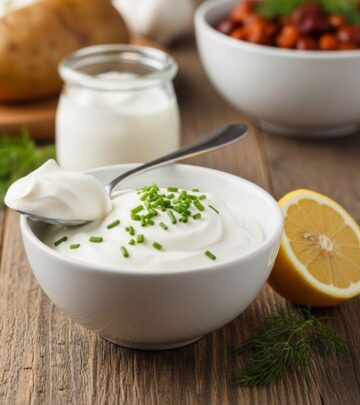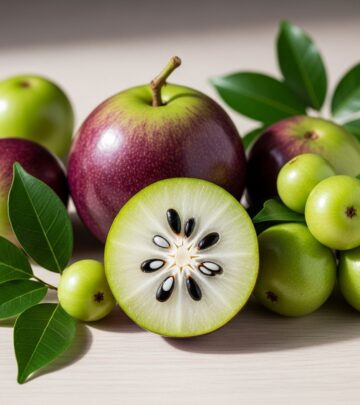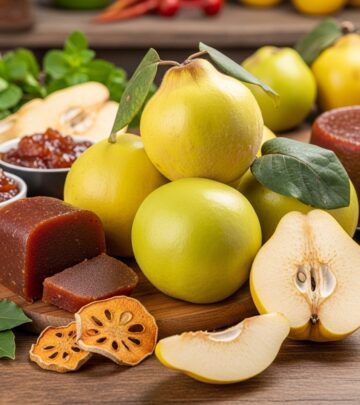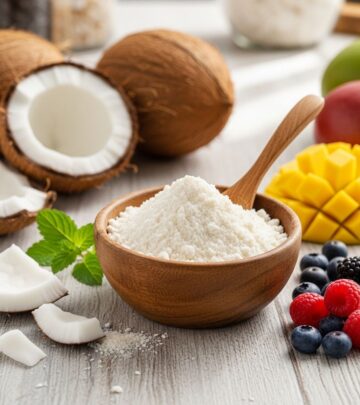Oat Milk: Nutrition Facts, Health Benefits, DIY Recipe & More
Enjoy a sustainable, allergy-friendly milk substitute that elevates drinks and dishes.
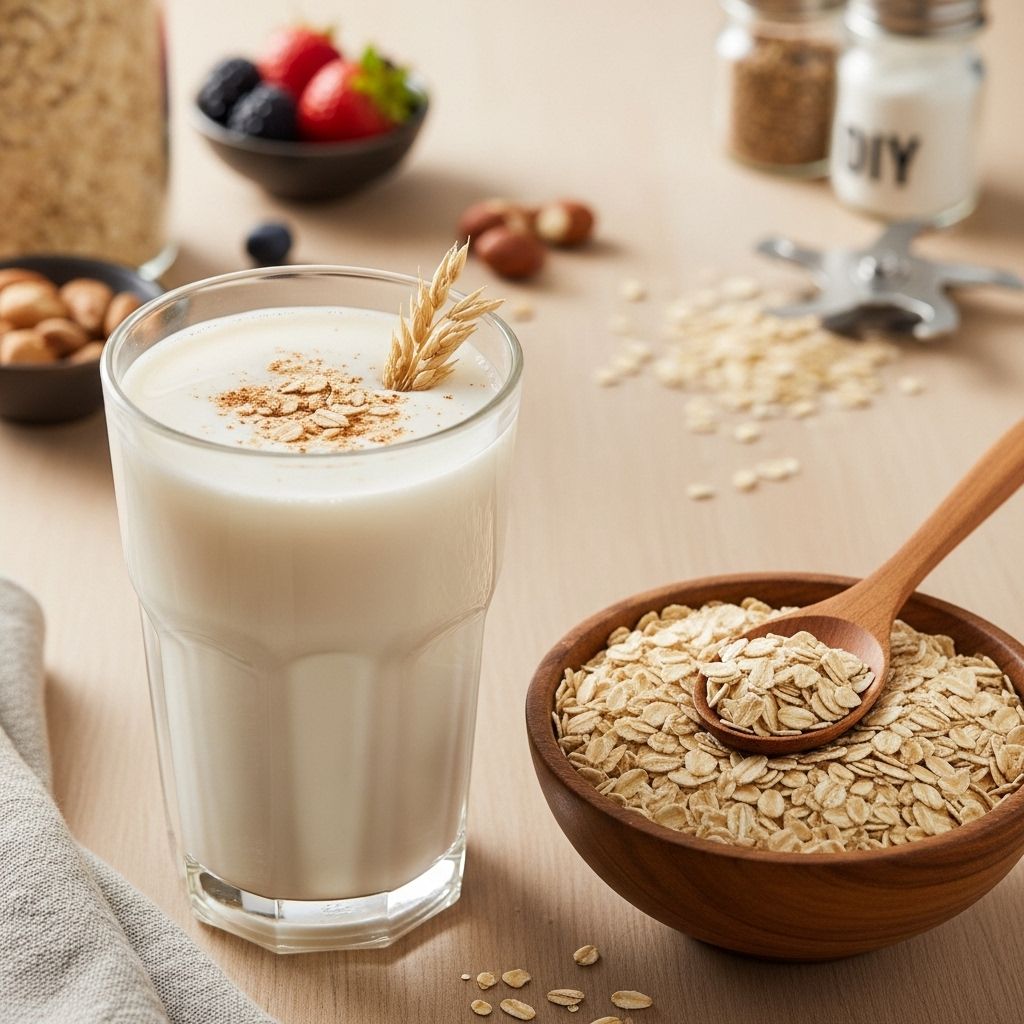
Oat milk has rapidly become a favorite among plant-based milk alternatives. Praised for its naturally sweet flavor, creamy texture, and versatility, it’s a staple in everything from coffee to baking. This article provides a comprehensive guide to oat milk: including nutrition facts, health benefits, potential side effects, and how you can make it at home. Read on to understand why oat milk is such a popular choice and how you can include it in your diet.
What Is Oat Milk?
Oat milk is a nondairy beverage made by blending oats with water, then straining the mixture to remove solids. The result is a creamy, slightly sweet milk substitute that works well in cereal, coffee, smoothies, and cooking. Commercial oat milk brands often fortify their products with vitamins and minerals and may add oils or thickeners for texture.
Why Is Oat Milk So Popular?
- Creamy Texture: Oat milk is thick, smooth, and froths exceptionally well, making it ideal for lattes and cappuccinos. Baristas favor oat milk for its ability to create microfoam, closely mimicking dairy milk’s mouthfeel.
- Mild, Sweet Flavor: Its naturally subtle sweetness and neutral taste suit a variety of dishes and drinks.
- Sustainability: Oats require less water and land compared to almonds or dairy cows, making oat milk a more eco-friendly choice.
- Allergy-Friendly: Oat milk is nut-free and suitable for those with dairy or soy allergies.
- Vegan-Friendly: As a plant-based option, oat milk fits well within vegan and vegetarian diets.
Nutritional Profile of Oat Milk
While the precise nutritional content varies by brand and whether it’s homemade or store-bought, here’s the average nutrition for unfortified oat milk (per 100 ml):
| Nutrient | Amount (per 100 ml) |
|---|---|
| Calories | 40–50 kcal |
| Protein | 1.25 g |
| Fat | 0.5–1.5 g |
| Carbohydrates | 7–9 g |
| Fiber | 0.8–1.0 g |
| Calcium (fortified) | Varies |
| Vitamin D (fortified) | Varies |
Store-bought oat milks are often fortified with calcium, vitamin D, vitamin B12, and other micronutrients to mimic the nutritional benefits of cow’s milk.
How Does Oat Milk Compare to Other Milks?
| Milk Type | Calories | Protein (g) | Fat (g) | Carbs (g) | Fiber (g) |
|---|---|---|---|---|---|
| Oat Milk | 40–50 | 1.25 | 0.5–1.5 | 7–9 | 0.8–1.0 |
| Cow’s Milk | 60–70 | 3.2 | 3.6 | 4.8 | 0 |
| Almond Milk | 30–35 | 0.5–1 | 2.5 | 1 | 0.5 |
| Soy Milk | 40–50 | 3–7 | 2 | 4 | 1 |
| Cashew Milk | 25–30 | 0.5 | 2 | 1 | 0.5 |
Compared to cow’s or soy milk, oat milk is lower in protein. If you use oat milk as your main milk alternative, make sure you get enough protein from other food sources.
Top 5 Health Benefits of Oat Milk
- 1. Supports Heart Health: Oat milk is rich in beta-glucan—a soluble fiber shown to help lower cholesterol levels. Beta-glucan binds to cholesterol in the gut, preventing its absorption and promoting heart health.
- 2. Promotes Good Digestion: Its fiber content aids in regular bowel movements and may help prevent constipation, providing a gentle boost to digestive wellness.
- 3. Supports the Immune System: Oats contain micronutrients such as vitamin E and zinc, supporting immune function.
- 4. Good for Skin: Oat compounds, including beta-glucans and antioxidants, may help soothe skin and reduce inflammation. Oat milk is a popular ingredient in skin care routines.
- 5. May Help Regulate Blood Sugar: The fiber in oat milk can slow the absorption of sugar, helping to maintain stable blood glucose levels and lowering risk for insulin spikes.
Potential Downsides & Side Effects
- Lower Protein Content: At only 1.25g per 100ml, oat milk is not a significant protein source compared to dairy or soy milk. Individuals relying on oat milk should ensure their diet includes other protein-rich foods.
- Commercial Additives: Some brands add oils, sugars, and thickeners, which can alter nutritional value and caloric content. Always check ingredient labels, especially if you are watching your intake of added sugar or fats.
- Possible Gluten Contamination: While oats are naturally gluten-free, cross-contamination may occur during processing. Those with celiac disease or gluten intolerance should choose certified gluten-free oat milk.
- Allergies: Oat milk is suitable for many with allergies, but individuals with oat sensitivities should avoid it.
How to Make Oat Milk at Home
Making oat milk is straightforward and cost-effective. Homemade oat milk is free from additives and can be customized to suit your taste.
Basic Homemade Oat Milk Recipe
- Ingredients:
- 1 cup rolled oats
- 4 cups cold water
- Pinch of salt (optional)
- 1–2 teaspoons maple syrup (optional)
- 1/2 teaspoon vanilla extract (optional)
- Supplies:
- Blender
- Fine mesh sieve, nut milk bag, or cheesecloth
- Pitcher or jar for storage
- Instructions:
- Soak the oats in water for 15–30 minutes for a creamier, less slimy milk.
- Rinse and drain the oats thoroughly.
- Add oats and 4 cups water to the blender. Include salt, maple syrup, and vanilla if desired.
- Blend on high until smooth (about 30 seconds).
- Strain the mixture twice through a fine mesh sieve, nut milk bag, or cheesecloth to remove solids.
- Chill for at least 30 minutes before serving for best flavor.
The result is a fresh, creamy oat milk that can be used as a direct substitute for dairy milk in coffee, baking, sauces, cereal, and more.
Uses of Oat Milk
- Coffee & Tea: Oat milk’s ability to froth and emulsify makes it excellent for barista-style drinks.
- Baking: Substitute oat milk for dairy in muffins, cakes, pancakes, and breads.
- Cooking: Works well in savory sauces, creamy soups, and casseroles.
- Breakfast: Pour over cereal, granola, or blend into smoothies for added creaminess.
Oat Milk in the Vegan Diet
Oat milk is a popular option in vegan diets due to its dairy-free nature and versatility. Many vegan meal plans include oat milk among other alternatives like soy, almond, or coconut milk for nutrition and variety.
For those following a vegan diet, it is important to ensure adequate nutrient intake—especially protein, calcium, vitamins D and B12—since oat milk may be lower in these nutrients unless fortified.
Frequently Asked Questions (FAQs)
Q: Is oat milk gluten-free?
A: Oats themselves are gluten-free, but cross-contamination during processing is common. Look for products labeled “certified gluten-free” if you have celiac disease or gluten sensitivity.
Q: Does oat milk contain enough protein?
A: Oat milk contains significantly less protein than cow’s or soy milk. If using oat milk as your primary milk source, supplement your diet with protein-rich foods.
Q: Can oat milk cause allergies?
A: Oat milk is free from dairy, nuts, and soy, making it suitable for most allergy sufferers. However, some people may react to oats themselves.
Q: How does the taste of homemade oat milk compare to store-bought?
A: Homemade oat milk tends to have a fresher, less processed oat flavor. Commercial products may taste creamier due to added oils, thickeners, and sweeteners.
Q: Is oat milk suitable for children?
A: Oat milk can be given to children as part of a balanced diet but should not be a sole source of nutrition. Make sure their diet includes adequate protein and micronutrients.
Conclusion
Oat milk stands out as one of the most accessible, eco-friendly, and versatile plant-based milk alternatives. With its creamy texture, pleasant flavor, and fiber content, it supports heart and digestive health and fits within vegan and allergy-friendly diets. While it is not a significant source of protein, fortification and diet balance can compensate for nutritional gaps. Homemade oat milk is easy to make and allows for personalized flavor and texture. Whether you’re making lattes, baking, or simply enjoying a glass, oat milk brings a unique, nutritious twist to your kitchen.
References
Read full bio of Sneha Tete


